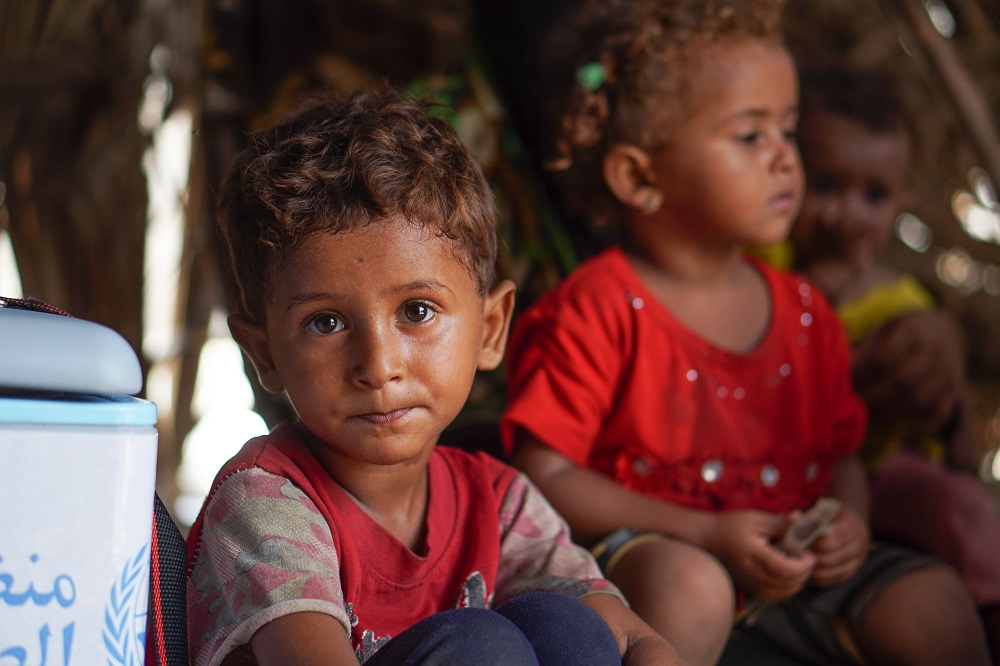 Credit: WHO/M. Al-Azraqi
Credit: WHO/M. Al-Azraqi
21 May 2023 – In May 2014, the WHO Director-General declared the international spread of poliovirus a Public Health Emergency of International Concern (PHEIC) under the International Health Regulations (IHR 2005), a designation that allows for accelerated response, emergency disbursement of funding and mitigation measures, such as vaccination of international travellers, to reduce the risk of spread of poliovirus. Nine years and several expert-led reviews later, polio retains its PHEIC status. COVID-19 and mpox have joined and recently left the list of diseases with this designation, but poliovirus still poses a risk of international spread. As noted with detections of variant poliovirus around the world in several previously polio-free countries, including Canada, Israel, the United Kingdom of Great Britain and Northern Ireland and the United States of America, poliovirus anywhere is a threat to children everywhere.
Despite retaining its PHEIC status, the polio eradication programme has made tremendous strides in the last 3 and a half decades. These efforts have brought the world to the best yet position in terms of achieving our goal of eradication.
In WHO’s Eastern Mediterranean Region, home to constantly brewing humanitarian crises and the last 2 countries endemic for wild poliovirus – Afghanistan and Pakistan – transmission has been cornered to the smallest ever geographical location. Up until now, in 2023, 2 cases of wild poliovirus have been reported from Afghanistan and one from Pakistan – all from the endemic zone in the East Region of Afghanistan and southern districts of Khyber Pakhtunkhwa, Pakistan. Both countries have also cut down the genetic diversity of the virus since 2020 – from 8 to one in Afghanistan and 11 to one in Pakistan.
Years of extraordinary efforts by frontline workers, national and local authorities, the partners of the Global Polio Eradication Initiative (GPEI) and donors the world over have led us to our best yet opportunity to snuff out this virus once and forever.
The footprint of circulating variant poliovirus in the Region has also reduced considerably in recent years. The Region has fewer outbreaks today than it had a year ago. Last year, Sudan closed its 2020 cVDPV2 outbreak and Islamic Republic of Iran closed a poliovirus event, while both Djibouti and Egypt are no longer detecting any poliovirus in environmental samples and are poised to formally close their outbreaks in a few weeks.
Polio surveillance systems have never been more sensitive. 18 of the Region’s 22 countries have established environmental surveillance systems to complement the networks of surveillance workers and health care providers actively searching for acute flaccid paralysis in children. In addition to countries at high risk of polio, the list also includes longstanding polio-free countries, such as Bahrain and Saudi Arabia, underscoring the importance of surveillance in all countries as the Region moves towards certification.
Investments made in polio have demonstrated their value for broader healthcare, such as during COVID-19 when the polio assets supported testing, vaccination and risk communication. The Region is making progress with polio transition to ensure countries maintain much-needed essential functions, even as funding transitions away from GPEI financing to national domestic resources or WHO base budget. These efforts will strengthen disease surveillance, routine immunization for children, and outbreak preparedness and response capacities.
The polio programme regularly engages with Member States through governing bodies such as the Regional Subcommittee for Polio Eradication and Outbreaks and uses expert advice by technical advisory groups of experts to review progress in the Region and support countries to stop transmission and maintain robust surveillance and immunization programmes. But to deliver on the promise of a polio-free world for future generations, there is still more work to be done. Across the Region, we are in a race against time to intensify surveillance, enhance the quality of immunization campaigns, and strengthen preparedness for and response to polio outbreaks, while ensuring any gender-related barriers are mitigated across all levels of the programme.
As WHO Member States gather in Geneva for the 76th annual World Health Assembly, now is the time to dig deep, draw on our strength as a partnership and the strength of donors and host governments, and achieve the goal we declared more than 3 decades ago.
Some urgent actions that countries can take up are listed by the IHR 2005 here: Statement of the thirty-fourth Polio IHR Emergency Committee (who.int).








